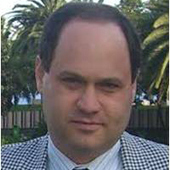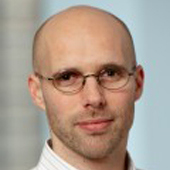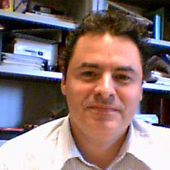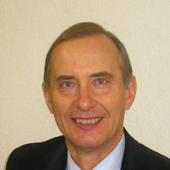
Prof. Plamen Angelov
Title: Autonomous Learning for Autonomous Systems
Abstract
Autonomous Systems were identified as one of the great technologies together with the robotics, (Big) Data, Digital, Health, Energy, etc.
While it is often related to “drones” or RPAV, UxVs, etc. autonomy is much more than that and is central to what will be the next revolution of industry and transport, our environment we live in and this is already happening now through the Smart Industry (Industrie 4.0), driverless cars, trains and subway trains, cash tills at large supermarkets, collaborative care etc.
In this talk the experience of the author and his group at Lancaster in pioneering Autonomous Learning Systems as pivotal to not only Autonomous Systems but also to Transforming the Big Data Streams into meaningful manageable actionable information will be discussed.
Bio
Professor Angelov has 25+ years of professional experience in high level research and holds a Personal Chair in Intelligent Systems at Lancaster University, UK. He leads the Data Science groups at the School of Computing and Communications which includes over 20 academics, researchers and PhD students and is one of the eight groups of the School. Prof. Angelov is a Fellow of IEEE for contributions to neuro-fuzzy and autonomous learning systems an of the IET. HE is also Board of Governors member of the International Neural Networks Society (INNS) and of the Systems, Man and Cybernetics Society where he also Chairs a Technical Committee (TC) on Evolving Intelligent Systems within the and a member of several other TCs. Within SMC Society this includes the TC on Diagnostics and Prognostics. More generally within IEEE, Prof. Angelov is a member of the TC on Neural Networks and TC on Fuzzy Systems within the Computational Intelligence Society, IEEE. Prof. Angelov has authored or co-authored over 200 peer-reviewed publications in leading journals, peer-reviewed conference proceedings, 5 patents, two research monographs (by Wiley, 2012 and Springer, 2002) and over a dozen other books. These publications has been cited over 5000 times (Google Scholar) with an h-index of 34; i10-index is 71. He and his co-authors and students received a number of IEEE best paper awards (2006, 2009, 2012, 2013) as well as one of his papers was nominated for outstanding IEEE Transactions paper (2010). His most cited paper has over 580 citations. He has an active research portfolio in the area of computational intelligence and machine learning and internationally recognised results into online and evolving learning and algorithms for knowledge extraction in the form of human-intelligible fuzzy rule-based systems. Prof. Angelov leads numerous projects (including several multimillion ones) funded by UK research councils, EU, industry, UK Ministry of Defence. His research was recognised by ‘The Engineer Innovation and Technology 2008 Special Award’ and ‘For outstanding Services’ (2013) by IEEE and INNS. He is also the founding co-Editor-in-Chief of Springer’s journal on Evolving Systems and Associate Editor of the leading international scientific journals in this area, including IEEE Transactions on Cybernetics, IEEE Transactions on Fuzzy Systems and several other journals including Applied Soft Computing, Fuzzy Sets and Systems, Soft Computing, etc. He was General Chair of primes conferences (IJCNN-2013, Dallas, Texas, 4-9 August 2013, Texas, USA; INNS inaugural Conference on Big Data, San Francisco, August, 2015) and Programme Committee co-Chair of prime conferences (FUZZ-IEEE- 2014, July 2014, Beijing, China; IEEE Intelligent Systems’14, Warszaw, Poland; IJCNN2016, Vancouver, Canada); founding General co- Chair of a series of annual IEEE conferences on Evolving and Adaptive Intelligent Systems. Prof. Angelov is often acting as a Visiting Professor (in Brazil, 2007 and 2014; Germany, 2006; Spain, 2010; France, 2014; Bulgaria, 2011-14) regularly gives invited and plenary talks at leading companies and universities. Prof. Angelov is a member of the Special Interest Group (SIG) on Autonomous Machine Learning, International Neural Network Society, since 2008, co-ordinator of the Working Group on Data Mining and Learning to EUSFLAT since 2007, member of ISGEC (International Society of Genetic and Evolutionary Computation) and its Council of Authors, since 2002; member of the Senior Members sub-committee, IEEE, 2008-2010; North American Fuzzy Information Processing Society, NAFIPS, 2001,2005; member of the Innovation Award Committee for the World Congress on Nature and Biologically Inspired Computing, December 2009. Prof. Angelov gave over a dozen plenary and key note talks at high profile conferences. More information can be found at his web site www.lancs.ac.uk/staff/angelov

Prof. Heinz Koeppl
Title: Reverse-engineering large-scale collective behaviour
Abstract
Bio
Since January 2014 Heinz Koeppl is a full professor at the Department of Electrical Engineering and Information Technology at TU Darmstadt. Prior to that he was a SNSF assistant professor at the Automatic Control Lab of ETH Zurich and a group leader at IBM Research – Zurich.
He got his M.Sc. in theoretical physics from Graz Karl-Franzens University, Austria (2001) and his Ph.D. in electrical engineering from Graz University of Technology, Austria (2004). After doing his civil service for the Austrian federal government for a year, he went on as a Schroedinger fellow to UC Berkeley, USA to work with Leon Chua at the EECS department. From fall 2006 to fall 2010 he has been a postdoc at the Laboratory of Nonlinear Systems (Martin Hasler) at the School of Communication and Computer Sciences, EPFL (Ecole Polytechnique Federal de Lausanne) Lausanne, Switzerland. In spring 2008, he was a visiting research fellow at the Department of Systems Biology, Harvard Medical School, Boston USA, working together with Walter Fontana.
Heinz is currently working on parameter inference and on model selection and reduction in the context of cellular signal transduction. He works closely together with the group of Matthias Peter at the Institute of Biochemistry, ETH Zurich. Heinz is also leading a project with Novartis Institute for BioMedical Research (NIBR) Basel on computational drug-target identification.

Prof. Manuel Núñez
Title:Formal Development of Implantable Medical Devices
Abstract
Bio
Manuel Núñez holds a PhD in Mathematics/Computer Science, obtained in 1996, and a Master’s degree in Economics, obtained in 2002. He is a Professor of Computer Science in the Universidad Complutense de Madrid, Spain. He is also a Visiting Professor at the School of Information Systems, Computing and Mathematics of Brunel University, UK.
His research deals with the use of formal methods in different application areas. Currently, he is mainly working in testing complex systems and on the use of formal methods in user modeling, with an emphasis on collective intelligence. In particular, he is interested in the inclusion/addition/adaption of formal methods and economic concepts and systems.
He is a member of the IEEE SMC Technical Committee on Computational Collective Intelligence, a member of the Board of Directors of the Tarot Summer School on Software Testing, a member of the A-MOST Workshop Steering Committee and was a member of the ICTSS Steering Committee for the period 2009-2012. He is an Associate Editor of the Vietnam journal of Computer Science, a member of the Editorial Boards of the Transactions on Computational Collective Intelligence and of the Journal of Universal Computer Science, and a member of the Review Board of the International Journal of Information Technology and Web Engineering. He has served in more than 110 Program Committees of international conferences and workshops in Computer Science. He has published more than 130 papers in international scientific journals and conferences.

Prof. Leszek Rutkowski
Title: Knowledge Discovery in Data Streams: Regression and Classification Algorithms
Abstract
Bio
Director of the Institute of Computational Intelligence, Czestochowa University of Technology, Poland.
His research interests include data stream mining, big data analysis, neural networks, fuzzy systems and pattern classification. He has published more than 200 technical papers, including 22 in various series of IEEE Transactions.
He is a recipient of the IEEE Transactions on Neural Networks 2005 Outstanding Paper Award. He served in the IEEE Computational Intelligence Society as the chair of the Distinguished Lecturer Program (2008-2009) and the chair of the Standards Committee (2006-2007). He is the founding chair of the Polish chapter of the IEEE Computational Intelligence Society, which won the 2008 Outstanding Chapter Award. In 2004, he was elected as a member of the Polish Academy of Sciences. In 2004, he was awarded by the IEEE Fellow membership grade for contributions to neurocomputing and flexible fuzzy systems.
He is the president and founder of the Polish Neural Networks Society. He was an associate editor of the IEEE Transactions on Neural Networks (1998-2005) and IEEE Systems Journal (2007-2010). He is an editor-in-chief of the Journal of Artificial Intelligence and Soft Computing Research, and he is on the editorial board of the IEEE Transactions on Cybernetics, International Journal of Neural Systems, International Journal of Applied Mathematics and Computer Science and International Journal of Biometric.